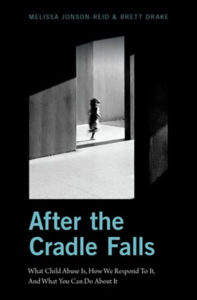New book aims to explain what everyone can do to help kids who need it most
From the WashU Newsroom…
Children need nurturing, attention to health and basic needs, safety and appropriate supervision. Child abuse and neglect, also called “child maltreatment,” too often endanger the health, well-being and even lives of children.
Especially for the very young child, maltreatment can result in a variety of serious issues, including physical injury; cognitive delay; disruption of the stress response system that may result in long-term problems with emotion regulation and health; and even death, said Melissa Jonson-Reid, the Ralph and Muriel Pumphrey Professor of Social Work Research at the Brown School at Washington University in St. Louis.
Child abuse is not one thing. It can take the form of physical abuse, sexual abuse, neglect or emotional abuse, and many children suffer multiple forms.
“Older children may be less vulnerable to serious and fatal physical injury but remain vulnerable to emotional harm and injury due to lack of supervision and other issues,” Jonson-Reid said.
“Older children are also more likely to experience multiple forms of maltreatment and other overlapping risk conditions that can increase the likelihood of poor outcomes,” she said. “Older children and youth with histories of maltreatment have higher risk of behavioral, mental health and physical health consequences, including lower school performance, poor mental and physical health outcomes, suicide, long-term adult health problems and more.”
But what can be done to solve it? Jonson-Reid and Brett Drake, professor at the Brown School, offer insight into this prevalent problem and some ideas for change in a new book released Jan. 9 by Oxford University Press, “After the Cradle Falls: What Child Abuse Is, How We Respond To It, And What You Can Do About it.”
“Child maltreatment is a critical issue that is not in the public discourse — until something tragic happens,” Jonson-Reid said. “Typically reactions to the horrific cases, which make it into the news, result in very little actual change that addresses the needs of the millions of children impacted annually who do not experience such extreme conditions. The goal of the book was to try to change this.